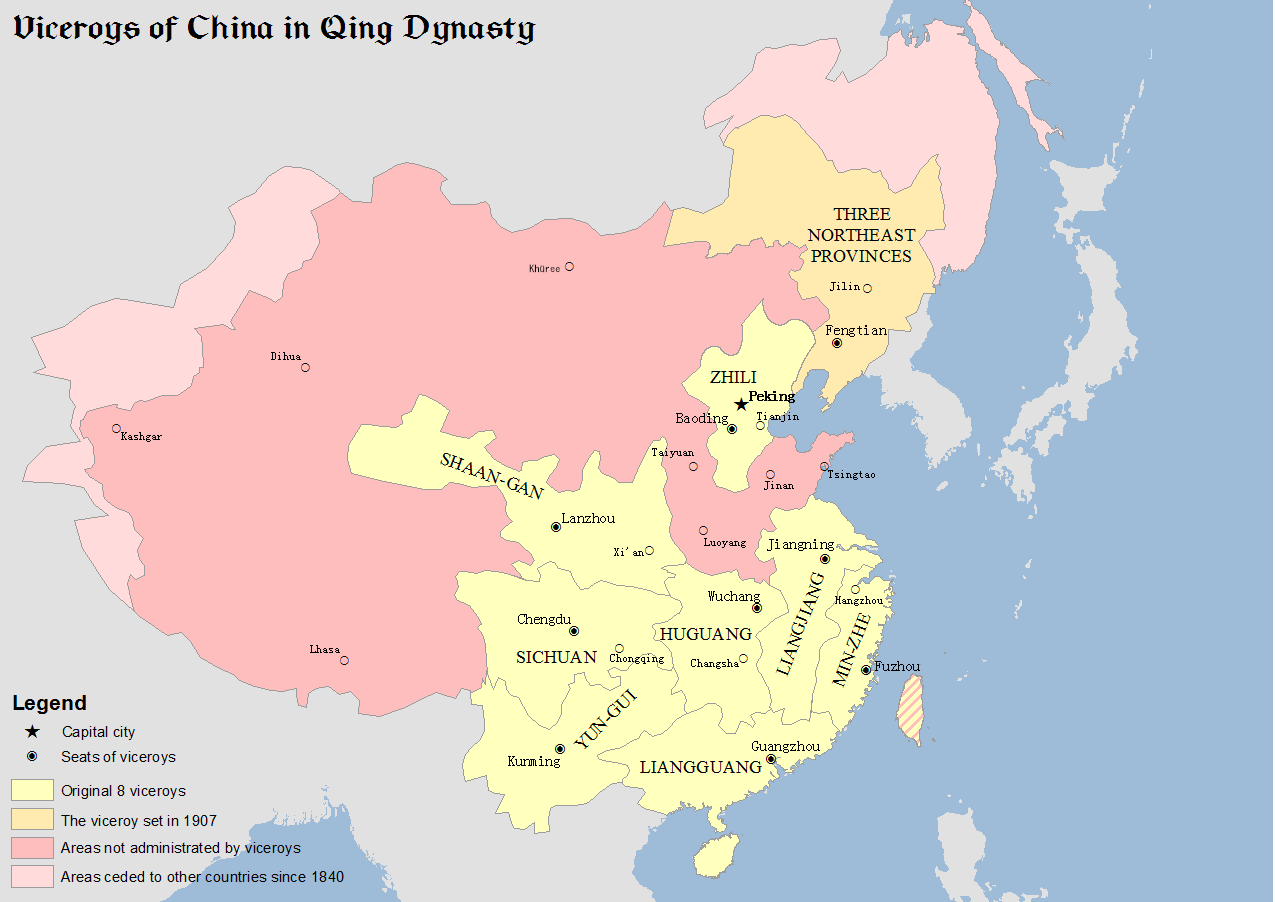|
Zhang Decheng
Zhang Decheng or Chang De-Cheng (; 1846 – late-July 1900) was a Chinese nationalist and leader of the Fists of Harmony and Justice during the Boxer Uprising The Boxer Rebellion, also known as the Boxer Uprising, the Boxer Insurrection, or the Yihetuan Movement, was an anti-foreign, anti-colonial, and anti-Christian uprising in China between 1899 and 1901, towards the end of the Qing dynasty, by .... Though working as a boatman during his youth, he would spend much of the Boxer Rebellion as a leader of the group he created, the Fists of Harmony and Justice. Biography Born in either Zhaozhang or Goucun village in the Zhili Province of the Qing Dynasty, Zhang would spend much of his youth as a boatman along the Daqing, Ziya, and other rivers in Zhili. As time went on and foreign contacts in Northern China increased, particularly the actions of western missionaries, Zhang and other similar-minded individuals would set out to "destroy foreigners". Though the Fists of ... [...More Info...] [...Related Items...] OR: [Wikipedia] [Google] [Baidu] |
Yihetuan Flag
The Boxer Rebellion, also known as the Boxer Uprising, the Boxer Insurrection, or the Yihetuan Movement, was an anti-foreign, anti-colonial, and anti-Christian uprising in China between 1899 and 1901, towards the end of the Qing dynasty, by the Society of Righteous and Harmonious Fists (), known as the "Boxers" in English because many of its members had practised Chinese martial arts, which at the time were referred to as "Chinese boxing". After the Sino-Japanese War of 1895, villagers in North China feared the expansion of foreign spheres of influence and resented the extension of privileges to Christian missionaries, who used them to shield their followers. In 1898 Northern China experienced several natural disasters, including the Yellow River flooding and droughts, which Boxers blamed on foreign and Christian influence. Beginning in 1899, Boxers spread violence across Shandong and the North China Plain, destroying foreign property such as railroads and attacking or m ... [...More Info...] [...Related Items...] OR: [Wikipedia] [Google] [Baidu] |
Tianjin
Tianjin (; ; Mandarin: ), alternately romanized as Tientsin (), is a municipality and a coastal metropolis in Northern China on the shore of the Bohai Sea. It is one of the nine national central cities in Mainland China, with a total population of 13,866,009 inhabitants during the 2020 Chinese census. Its built-up (''or metro'') area, made up of 12 central districts (all but Baodi, Jizhou, Jinghai and Ninghe), was home to 11,165,706 inhabitants and is also the world's 29th-largest agglomeration (between Chengdu and Rio de Janeiro) and 11th- most populous city proper. It is governed as one of the four municipalities under the direct administration of Chinese central government and is thus under direct administration of the State Council. Tianjin borders Hebei Province and Beijing Municipality, bounded to the east by the Bohai Gulf portion of the Yellow Sea. Part of the Bohai Economic Rim, it is the largest coastal city in Northern China and part of the Jing-Jin-Ji ... [...More Info...] [...Related Items...] OR: [Wikipedia] [Google] [Baidu] |
Chinese People Of The Boxer Rebellion
Chinese can refer to: * Something related to China * Chinese people, people of Chinese nationality, citizenship, and/or ethnicity **''Zhonghua minzu'', the supra-ethnic concept of the Chinese nation ** List of ethnic groups in China, people of various ethnicities in contemporary China ** Han Chinese, the largest ethnic group in the world and the majority ethnic group in Mainland China, Hong Kong, Macau, Taiwan, and Singapore ** Ethnic minorities in China, people of non-Han Chinese ethnicities in modern China ** Ethnic groups in Chinese history, people of various ethnicities in historical China ** Nationals of the People's Republic of China ** Nationals of the Republic of China ** Overseas Chinese, Chinese people residing outside the territories of Mainland China, Hong Kong, Macau, and Taiwan * Sinitic languages, the major branch of the Sino-Tibetan language family ** Chinese language, a group of related languages spoken predominantly in China, sharing a written script (Chinese ... [...More Info...] [...Related Items...] OR: [Wikipedia] [Google] [Baidu] |
19th-century Chinese People
The 19th (nineteenth) century began on 1 January 1801 ( MDCCCI), and ended on 31 December 1900 ( MCM). The 19th century was the ninth century of the 2nd millennium. The 19th century was characterized by vast social upheaval. Slavery was abolished in much of Europe and the Americas. The First Industrial Revolution, though it began in the late 18th century, expanding beyond its British homeland for the first time during this century, particularly remaking the economies and societies of the Low Countries, the Rhineland, Northern Italy, and the Northeastern United States. A few decades later, the Second Industrial Revolution led to ever more massive urbanization and much higher levels of productivity, profit, and prosperity, a pattern that continued into the 20th century. The Islamic gunpowder empires fell into decline and European imperialism brought much of South Asia, Southeast Asia, and almost all of Africa under colonial rule. It was also marked by the collapse of the la ... [...More Info...] [...Related Items...] OR: [Wikipedia] [Google] [Baidu] |
Qing Dynasty Rebels
The Qing dynasty ( ), officially the Great Qing,, was a Manchu-led imperial dynasty of China and the last orthodox dynasty in Chinese history. It emerged from the Later Jin dynasty founded by the Jianzhou Jurchens, a Tungusic-speaking ethnic group who unified other Jurchen tribes to form a new "Manchu" ethnic identity. The dynasty was officially proclaimed in 1636 in Manchuria (modern-day Northeast China and Outer Manchuria). It seized control of Beijing in 1644, then later expanded its rule over the whole of China proper and Taiwan, and finally expanded into Inner Asia. The dynasty lasted until 1912 when it was overthrown in the Xinhai Revolution. In orthodox Chinese historiography, the Qing dynasty was preceded by the Ming dynasty and succeeded by the Republic of China. The multiethnic Qing dynasty lasted for almost three centuries and assembled the territorial base for modern China. It was the largest imperial dynasty in the history of China and in 1790 t ... [...More Info...] [...Related Items...] OR: [Wikipedia] [Google] [Baidu] |
Chinese Nationalists
The Kuomintang (KMT), also referred to as the Guomindang (GMD), the Nationalist Party of China (NPC) or the Chinese Nationalist Party (CNP), is a major political party in the Republic of China, initially on the Chinese mainland and in Taiwan after 1949. It was the sole party in China during the Republican Era from 1928 to 1949, when most of the Chinese mainland was under its control. The party retreated from the mainland to Taiwan on 7 December 1949, following its defeat in the Chinese Civil War. Chiang Kai-shek declared martial law and retained its authoritarian rule over Taiwan under the ''Dang Guo'' system until democratic reforms were enacted in the 1980s and full democratization in the 1990s. In Taiwanese politics, the KMT is the dominant party in the Pan-Blue Coalition and primarily competes with the rival Democratic Progressive Party (DPP). It is currently the largest opposition party in the Legislative Yuan. The current chairman is Eric Chu. The party originated ... [...More Info...] [...Related Items...] OR: [Wikipedia] [Google] [Baidu] |
Viceroy Of Zhili
The Viceroy of Zhili, fully referred to in Chinese as the Governor-General of Zhili and Surrounding Areas Overseeing Military Affairs and Food Production, Manager of Waterways, Director of Civil Affairs, was one of eight regional Viceroys during the Qing dynasty. The Viceroy of Zhili was an important post because the province of Zhili, which literally means "directly ruled", was the area surrounding the imperial capital, Beijing. The administrative centre was in Tianjin even though the provincial capital was in Baoding. The Viceroy's duties as well as responsibilities have never been defined entirely. Generally speaking, the Viceroy oversaw the military and civil affairs of Zhili, Shandong and Henan provinces. The Viceroy of Zhili was also highly influential in imperial court politics. History The office was first created on 30 September 1649 during the reign of the Shunzhi Emperor, but was later abolished on 1 June 1658. On 23 November 1661, during the reign of the Kangxi Empe ... [...More Info...] [...Related Items...] OR: [Wikipedia] [Google] [Baidu] |
Cao Futian
Cao Futian () was a Chinese nationalist and leader of the Boxers during the Boxer Uprising. He was executed in 1901. Biography Little is known of the early life of Cao Futian but he was born during the 19th century, in Jinghai, Zhili province, China. Cao had been a soldier. He raised a militia in Tiānjīn, formed in its majority by illiterate people such as laid-off railway workers, Chinese religious fanatics, criminals, and unemployed youth. He was a master of Kung Fu and a charismatic leader. Cao hated foreigners because of the establishment of the foreign concessions, but even more because of the spread of Christianity by missionaries. He thought Chinese Christians should be expelled for tainting the purity of the Chinese culture. First hostile to the Chinese Imperial Army, he fought them in August 1899. The Qing government was divided as to how to react to the Boxers’ activities, but conservative elements of the court were in favour of them. Prince Duan, a fervent supp ... [...More Info...] [...Related Items...] OR: [Wikipedia] [Google] [Baidu] |
Yìhéquán
The Boxer Rebellion, also known as the Boxer Uprising, the Boxer Insurrection, or the Yihetuan Movement, was an anti-foreign, anti-colonial, and anti-Christian uprising in China between 1899 and 1901, towards the end of the Qing dynasty, by the Society of Righteous and Harmonious Fists (), known as the "Boxers" in English because many of its members had practised Chinese martial arts, which at the time were referred to as "Chinese boxing". After the Sino-Japanese War of 1895, villagers in North China feared the expansion of foreign spheres of influence and resented the extension of privileges to Christian missionaries, who used them to shield their followers. In 1898 Northern China experienced several natural disasters, including the Yellow River flooding and droughts, which Boxers blamed on foreign and Christian influence. Beginning in 1899, Boxers spread violence across Shandong and the North China Plain, destroying foreign property such as railroads and attacking or m ... [...More Info...] [...Related Items...] OR: [Wikipedia] [Google] [Baidu] |
Wangkou, Hebei
Wangkou, Xinji () is a township-level division of Xinji, Shijiazhuang, Hebei, China. See also *List of township-level divisions of Hebei This is a list of township-level divisions of the province of Hebei, People's Republic of China (PRC). After province, prefecture, and county-level divisions, township-level divisions constitute the formal fourth-level administrative divisions ... References Township-level divisions of Hebei {{Shijiazhuang-geo-stub ... [...More Info...] [...Related Items...] OR: [Wikipedia] [Google] [Baidu] |
Daily Inter Mountain
Daily or The Daily may refer to: Journalism * Daily newspaper, newspaper issued on five to seven day of most weeks * ''The Daily'' (podcast), a podcast by ''The New York Times'' * ''The Daily'' (News Corporation), a defunct US-based iPad newspaper from News Corporation * ''The Daily of the University of Washington'', a student newspaper using ''The Daily'' as its standardhead Places * Daily, North Dakota, United States * Daily Township, Dixon County, Nebraska, United States People * Bill Daily (1927–2018), American actor * Elizabeth Daily (born 1961), American voice actress * Joseph E. Daily (1888–1965), American jurist * Thomas Vose Daily (1927–2017), American Roman Catholic bishop Other usages * Iveco Daily, a large van produced by Iveco * Dailies, unedited footage in film See also * Dailey, surname * Daley (other) * Daly (other) Daly or DALY may refer to: Places Australia * County of Daly, a cadastral division in South Australia * Daly Riv ... [...More Info...] [...Related Items...] OR: [Wikipedia] [Google] [Baidu] |





